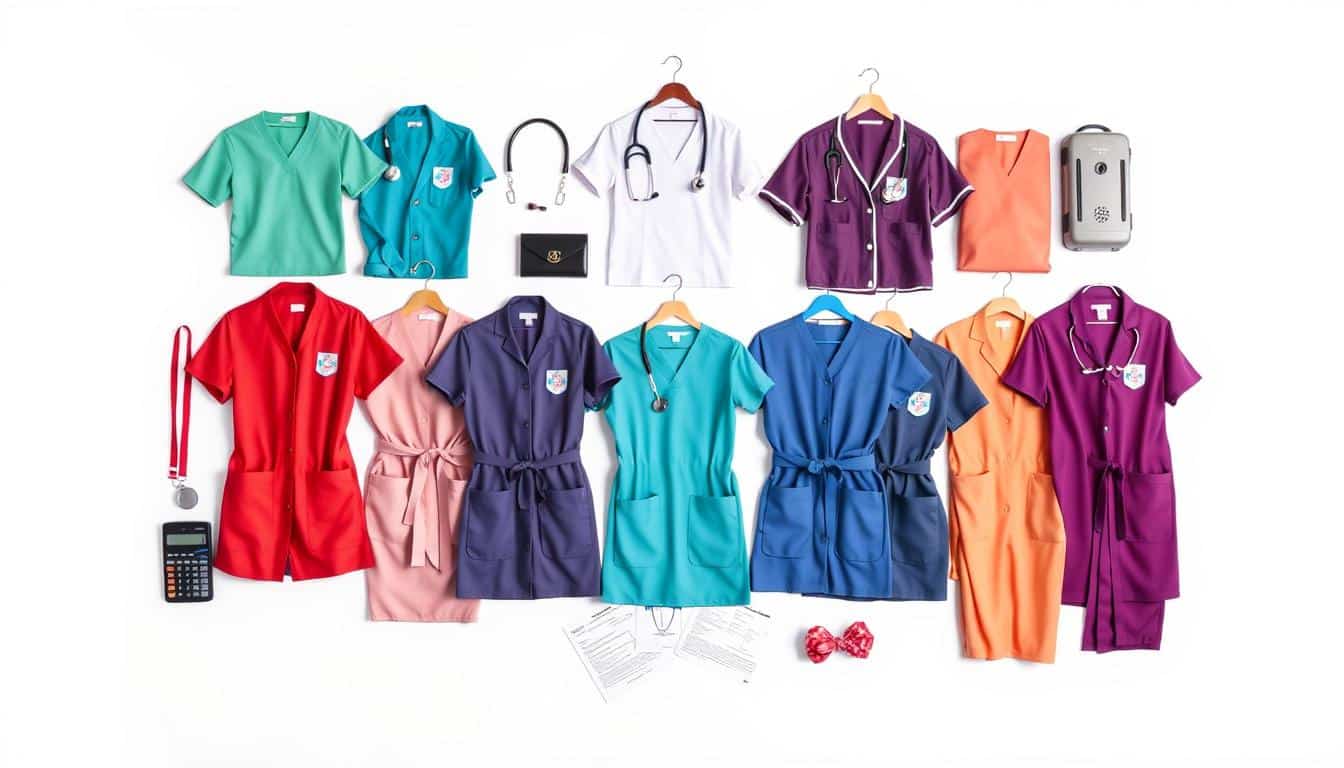As a dedicated nurse, you often find yourself in scrubs. But have you ever wondered if those uniforms are tax deductible? Knowing if your work clothes can be deducted can help a lot during tax season.
If your scrubs or shoes are only for work and not for everyday wear, you might get a tax break. But, uniforms given by your employer can’t be deducted. Keeping good records is key to getting the most out of your tax savings. Whether you work on your own or travel, saving money is important.
Key Takeaways
- Understand if your uniforms qualify as tax deductible.
- Track all receipts to support your tax claims.
- Know that employer-provided uniforms can’t be claimed.
- Self-employed nurses have greater deduction options.
- Consider mileage and other travel-related expenses in your calculations.
Understanding Tax Deductions for Nurses
As a nurse, you invest a lot in your profession. It’s crucial to understand the tax deductions available to you. Knowing these deductions can save you a lot on taxes. Many common deductions are overlooked, allowing you to keep more of your money.
Commonly Overlooked Deductions
Nurses often miss out on overlooked nurse tax deductions. Here’s a list of potential deductions you may be eligible for:
- Work attire and uniforms, including footwear that is specifically required for nursing duties.
- Laundering costs for these professional garments.
- Travel expenses related to work, such as mileage for patient visits or conferences.
- Home office deductions for contract nurses who need to work remotely.
- Unreimbursed expenses for essential nursing equipment like stethoscopes and PPE.
- Membership fees for professional organizations, as well as licensing and certification fees.
- Subscriptions to relevant industry magazines and required applications.
It’s important to keep detailed records of these expenses. This way, you can fully take advantage of tax deductions for nurses.
Changes in Tax Laws
Changes in tax laws have added complexity for nurses claiming deductions. The Tax Cuts and Jobs Act eliminated some deductions and classified others as miscellaneous. This means some deductions are mainly for self-employed nurses, while full-time employees face new limits.
Getting advice from a tax professional can help you deal with these tax law changes. They can help you maximize your deductions. Staying updated on IRS rules and reviewing your employment contracts for deductible expenses can also help your finances.
Are Nursing Uniforms Tax Deductible?
Nursing uniforms can lead to big tax savings if you know the IRS rules. This part explains what you need to know about nursing uniforms. It covers what qualifies for tax deductions and the costs of keeping these important clothes.
Criteria for Deductibility
To see if your nursing uniforms are tax-deductible, follow these tips:
- The uniforms must be needed for your job.
- They should not be good for daily wear; things like scrubs or special shoes usually qualify.
- These costs can’t be covered by your employer.
If you meet these rules, you can count your nursing uniform costs as deductible nursing expenses. Keep receipts and detailed records of your purchases. This will help you when you do your taxes.
Laundering and Maintenance Costs
Costs for washing your nursing uniforms can also be tax-deductible. If your employer doesn’t handle laundry, you might be able to deduct these expenses. Make sure to keep track of all cleaning and upkeep costs for your uniforms. Deductible nursing expenses include more than just buying uniforms:
- Dry cleaning bills
- Shoe shining costs
- Tailoring expenses
Every expense counts, so it’s important to keep accurate records. This way, you can get the most tax deductions possible at tax time.
Other Tax Considerations for Nurses
As a nurse, you might think uniform-related deductions are the limit of your tax-saving potential. Spoiler alert: they’re not! There are many other tax considerations for nurses that can save you money. Expenses like licensing fees, union dues, and education costs can add up significantly at tax time.
Are you a travel nurse? Well, you’re in for a treat—because travel-related expenses are ripe for deductions. This includes mileage, meals, and lodging when you’re temporarily stationed far from home. If you’re self-employed, you can even qualify for the Self-Employed Health Insurance Deduction. Keeping immaculate records of all your nursing deductions is crucial to maximizing your benefits.
Let’s not forget about home office costs. If you’re working from home, expenses like mortgage interest, utilities, and repairs are potential write-offs. Professional fees for memberships and subscriptions that you need for your job can also count as deductible. To navigate the complex web of tax deductions effectively, collaborating with a tax advisor can illuminate any eligible expenses that could enhance your financial well-being. So, don’t hesitate to dig deep into those health insurance deductions and other savings opportunities!








